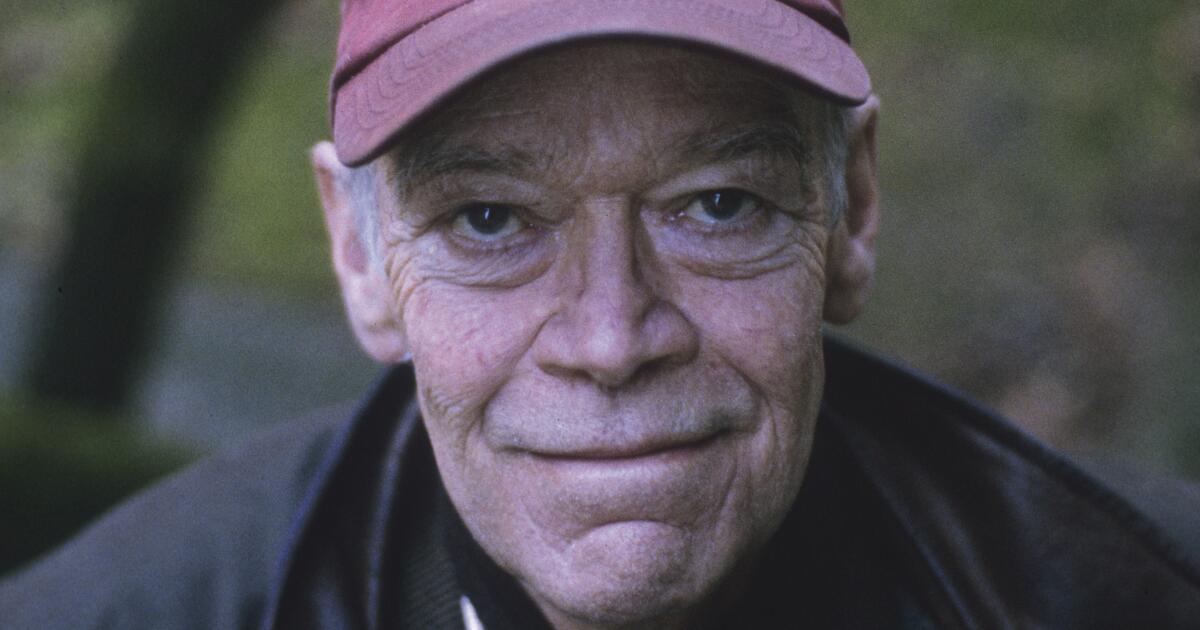
Review
Father and Son: A Memoir
By Jonathan Raban
Knopf: 336 pages, $28
If you buy books linked on our site, The Times may earn a commission from Bookshop.org, whose fees support independent bookstores.
On June 11, 2011, three days short of his 69th birthday, Jonathan Raban woke up feeling queasy. He did what most of us would do over the next few hours — nothing, hoping it would just get better.
It didn’t. After a meal spent trying and failing to move a knife over his plate, the acclaimed critic, essayist and travel writer asked his teenage daughter Julia to drive him to a hospital north of Seattle, where he was diagnosed with a massive hemorrhagic stroke that had paralyzed the right side of his body.
“You should have come in before: the earlier we get to see a patient, with a stroke, the more we can do,” said the attending doctor. For a man who relied on his brain and his body for his life’s vocation, the news couldn’t have been worse.
But Raban, who died in January at age 80, was a man not easily daunted; miraculously, most of his reading and writing abilities remained intact. He embarked on a strenuous and exhausting campaign of recovery, and as his struggles played out on a Seattle rehab ward, he began both to record his own experiences and to revisit the letters of his English father, written in the trenches of World War II. Raban hoped to draw courage from his parents’ wartime experiences — and to understand his father better.
“Father and Son,” the posthumously published memoir that emerged, follows the author from the onset of his stroke through five weeks in the ward. Twelve years in the making, written with the aid of voice dictation software, it is a singular accomplishment, especially knowing now that complications from the stroke eventually killed him. Everything that’s matchless about Raban’s work — his hyperacute eye for detail, his powers of synthesis, his mordant sense of humor, his vast reservoirs of knowledge and his love of travel — is there.
It also mirrors other Raban books (“Old Glory,” “Bad Land,” “Passage to Juneau”) in that the narrator, a Brit who moved to Seattle in 1990, is a very prickly character indeed. As he himself acknowledges, Raban sizes up people quickly. While he bonded with several attendants and therapists, some of whom became friends, others were judged and found immediately wanting (“stupid” and “officious” are two of the milder terms applied to nurses who issue disagreeable directions or invade his privacy).
At times, this exasperated reader wanted to talk back in the vein of, “These people are trying to help you.” On the other hand, some comments from his caretakers bordered on the unforgivable. One doctor, meeting Raban for the first time, says: “Ah, yes, um … Jonathan. You’re the one who used to be a writer.” Though the comment “went off in my head with the force of a grenade,” Raban replied: “I very much hope that I’m still a writer.” He never stopped pushing back, and his distaste for authority and refusal to accept the status quo are probably the very things that fueled his recovery.
Raban’s chapters on his wars with the medical recovery complex, as well as his own body, are interspersed with his father’s three-year journey through WWII, from Dunkirk to North Africa to Italy and the Middle East. The sections on Peter Raban offer a marvelous blend of Jonathan’s memories, his research and his father’s eloquent letters to his mother.
Peter, who went on to become an Anglican priest, was an indifferent writer for most of his life, but his letters to his wife over three years of separation are graceful, fluid and immediate, constituting a “mighty archive” — a window into profound love as well as a ground-level view of the war for a British officer.
Raban’s father censored himself for security reasons and to avoid worrying Monica, putting aside the horror of the war in favor of the everyday Britishness of an officer’s life. In North Africa, he wrote in “his private trench, neatly dug for him by his batman Ransome, complete with a long shelf of compacted soil on which to keep his books and photographs along with every letter he’d had from Monica, carefully marked and bound with rubber bands.”
Raban fills in the blanks with histories (Tony Judt’s “Postwar,” Rick Atkinson’s Liberation Trilogy), biographies (Andrew Roberts on Churchill) and vivid memoirs by other soldiers who trod in the same footsteps as his father and remembered every detail of the weariness, filth and terror. These sections are gems of historical synthesis and insight into what made his father tick, from his matchless devotion to his wife to his entrenched class snobbery, racism and anti-Semitism.
As for Jonathan Raban’s life, while “Father and Son” chronicles his early days and his last years, there are blanks that will never be filled. He writes that he became estranged from his father and that there was a reconciliation of sorts, but he doesn’t go further. Maybe he simply ran out of steam or felt he had said enough. Maybe he had put it behind him.
Regardless of its ellisions (or maybe because of them), “Father and Son” has the feel of a valediction; its force is doubled by the knowledge that Raban spent what remained of his life trying to complete it. As he chronicles his own pain, anger and determination to play the hand his failing body has dealt him, the word bravery comes to mind over and over, and perhaps that above all is his true inheritance. Like father, like son.
Gwinn, a Pulitzer Prize-winning journalist who lives in Seattle, writes about books and authors.












